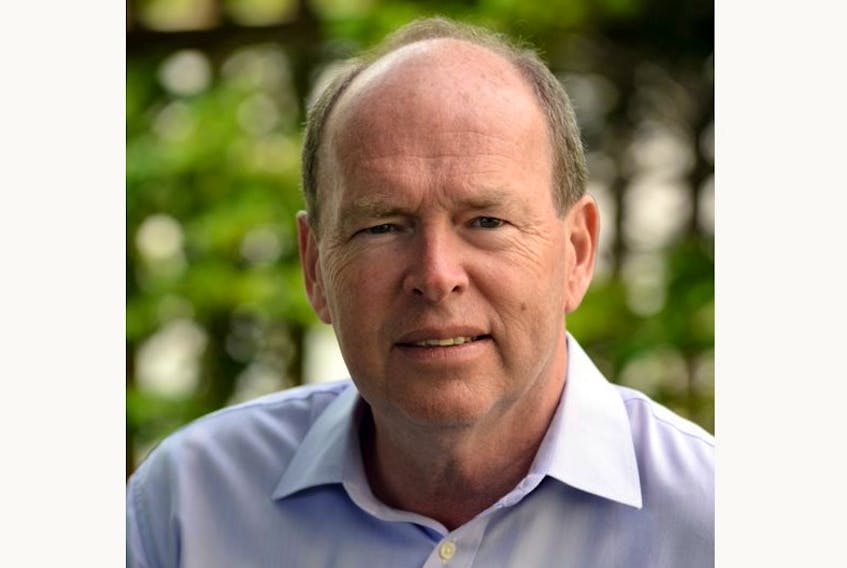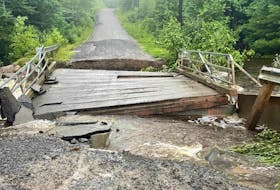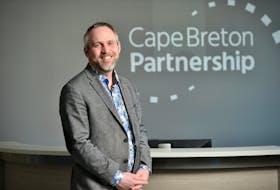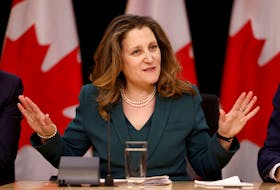ST. JOHN'S, N.L. — John Gerard Abbott says he would be the only premier in the province’s history with actual experience in government before taking a seat on the eighth floor of Confederation Building.
Born in St. John’s and now residing in Witless Bay, Abbott had an upbringing in the city that kept him connected to rural Newfoundland and Labrador.
“My father (William A. Abbott) is from Oderin Island, my mother (Angela Ennis) is from Merasheen Island. They both moved to St. John’s in the 1940s and got married in 1948. She was a teacher, he was working at the old Baird’s company and had his own business in the ’50s and ’60s,” said Abbott.
“We are a family of 10 children. I’m the number five in the order, with five after me."
"Initially, did I see myself in (the premier's) role? I didn’t. But the night the premier resigned, I thought through the implications of that and felt, after really a short deliberation, that I was the right person.” — John Abbott
Abbott graduated from Gonzaga High School before completing a bachelor of arts degree in political science and economics at Memorial University. He later completed a master of arts degree in public administration at Carleton University in Ottawa.
While the original family homes were resettled to Placentia, Abbott says the city-based family stayed in close contact with those who remained in the rural areas.
“I had cousins who grew up in Merasheen and then resettled and moved to Placentia. We would refer to ourselves as the city cousins going to visit the outport cousins,” said Abbott.
“We were envious of their lifestyle, they were envious of our lifestyle and everything we had access to in the big city, like the Avalon Mall and those kinds of things. We were very close and shared a lot of experiences. We still remain close in our adult lives.”
Abbott says his grandfather, Jack Ennis, has been his personal hero, having watched the man make a living on the sea for decades.
“He lived until he was just over 101 years old. He was a very healthy man, he kept his own house and was healthy up until his 99th birthday. He was very focused on work, hard work, and really lived his life without complaint. He fended well for his family. He and his wife, my grandmother, they had an ideal marriage and relationship. We always wanted to emulate him,” said Abbott.
“I was close to him. I tended to him in the nursing home right up until the time he died. I was just fascinated that he could go out day in, day out on the sea, in his own boat, usually with somebody else, up into his 80s. His partner was his brother-in-law, who was also 80. They’d work hard, lived hard, and he had to resettle when he was 70 years old and start all over again. Without complaint, he did what had to be done.”
Abbott’s professional life led him to be a deputy minister in the Department of Health during the administration of Danny Williams. After leaving the department after controversy with breast cancer screening that led to the Cameron Inquiry, Abbott was brought back into the civil service when the Liberals took power in 2015, where he resumed his post as deputy minister in the Department of Health. He is currently the CEO of the Canadian Mental Health Association – Newfoundland and Labrador. He sits on the board of directors of two private companies: Pratt Representatives and Steers Ltd. Abbott says he has resignation letters written for each position, should he be successful in the Liberal leadership race.
Abbott says he decided to jump in the race after witnessing the current government waiver on tough decisions.
“What I’ve felt for some time, working in government but also when I was outside government, was the missed opportunities from a public policy point of view, where government needed to make decisions to move our society forward,” he said.
“I felt that in recent years that wasn’t happening. It needed a voice and needed somebody that was committed to doing that. Initially, did I see myself in this role? I didn’t. But the night the premier resigned, I thought through the implications of that and felt, after really a short deliberation, that I was the right person.”
The Telegram offered a series of rapid-fire policy questions to determine where Abbott stands on some of the province’s greatest issues.
On the differences between himself and Dwight Ball
“The difference, I think for many if not all premiers up to this point in time, is they had no experience in government, in knowing how government works, the strengths and weaknesses, before they took the job of premier and head of government. That distinguishes me from pretty well all the forerunners, and my competitor. I understand government, I understand public policy, it’s my life, my passion. Really now I want to step out of the shadows, shall we say as a public servant, to move into the political role and a public role. That would distinguish me, certainly, from Dwight Ball. I’m a person who is very comfortable making decisions and prepared to deal with the consequences.”
On government size
“I believe it should be smaller, but there’s a Part A and a Part B. Smaller in the sense that we are delivering services that can be better delivered by the private sector or the community sector. The services need to be delivered, but government itself does not have to be the direct operator of those services. In terms of the role of government, there are certain roles and operations that government doesn’t need to directly deliver. When you look at how we compare to other jurisdictions, in terms of the number of public officials we have, I think we have to bring that down. But we need to balance that out.”
On outmigration
“We put out a policy position on that this week, where we talked about the need to look, seriously look, at a stronger partnership between government and the university and college system and our employers to make sure, one, that our academic and training programs are meeting the needs of the employers. We are hearing, certainly in the IT sector, for example, that jobs are not being filled because we just don’t have the educated/trained workers to go into those. That’s an opportunity lost. We want to make sure that employers can, at the get-go when students finish and are looking for work, that we look at apprenticeship programs and expand those. That’s something that’s worked in the past. We’ve done not too much in recent years and I want to expand that and bring that into the IT sector and the environmental sector to align students with training and jobs.”
Would you cancel Gull Island?
“I think how we deal with and solve Muskrat Falls will determine what and how we go with Gull Island. The initial idea was that this was to be a federal-provincial project in any event and the Williams government went away from that and went with Muskrat, a smaller project. I would like to go back to the original concept. Maybe that’s what we’re going to have to do with Muskrat Falls: turn it into a federal-provincial project and see how we can work together to solve that issue. Then can we move to the next project. I don’t know if there’s been any discussions, in recent years that I’m aware of, on that project. That’s where I would start.”
On minimum wage
“Nobody can live on the current minimum wage. We’ve said that we’d like to get that to $15 as soon as possible. We’re in the COVID world, so we know that can’t happen overnight, but I will be charging the economic task force we’ll be creating to look at how and how fast we can get to $15. I’m looking at two to three years. We need to move there quickly. That will help keep people attached to the workforce as well as attract people to the workforce, and allow people to live a little more easily than they do now. Of course, when people aren’t earning enough money the government is backing them up through other means, so there’s a win-win situation here if and how we move to $15. In essence, what the prime minister is doing under the emergency response for essential workers is to move them basically to $15 an hour. The math gives you that. We have that out there now for essential workers. We need to do that right throughout the economy.”
On corporate and union donations to political parties
"For party leadership campaigns, donations from corporations and unions should be compliant with the Elections Act. With respect to general elections, I have no immediate plans to ban these types of donations, but transparency is very important and donations from corproations and unions should be disclosed to the public."
On income tax changes
“In the short term, I don’t see any need for change in increasing or decreasing taxes. Some would like to see a decrease, but we need the revenues to pay for services. I want the economic task force to look at structural issues like our tax system and are there changes we should consider there, to make it more progressive. There’ve been different pieces of work done by the provincial government in recent years, (but) I don’t think (they) necessarily tackled the larger policies they need to look at from an income tax perspective that I would want to look at. Could we make this more progressive? Which could mean a couple of things. One, those on the lower end could pay less tax because we could change the credits and adjust them for inflation like the federal government has done in recent years. If you filled out your own tax form this year, you’ll see the fed's credits are much higher than the provincial credits for the same income levels. I want to look at that on one end, on the other end are those at the top end.”
On lessons from COVID-19
“Depending on where you are in the province and particularly the age cohort will dictate how people are feeling. The more senior in age, the more people are concerned about COVID and what should protect themselves, their family and their community. They’re watching what government is doing very, very closely. On the other side, younger people and urban areas and the businesses, certainly in the service sector, are wondering how we can open up the economy more so and looking at COVID more down the line. What I will bring forward here is that we need to bring better certainty on all the measures we’re taking around COVID. People who are coming into the province, we now know the only way COVID is coming here is by somebody who came from the outside. At our borders, we need to be more rigorous in our screening and testing.”
Land-based or ocean-based aquaculture?
“I’m supportive of both. The key thing for me and for the province is that the regulatory regime that’s in place needs to be world-class and that we rigorously apply the regulations. Again, transparency is important. The issue we had last year, I think in large part what got people upset about was there was no transparency in what had happened, who reported to whom, those kinds of things. Hopefully that’s a lesson we’ve learned and there will be transparency.”
On anti-racism strategies
“When I see it, I will call it out. I will want to, right at the beginning, I want to get a task force in place to develop an action plan for the province and engage the various communities, the Black community, the Asian community, the Arab community and all of those to bring them into a conversation and talk about their experiences and what they see are the institutional racism that we know is there. But also, the day-to-day things that are happening that we need to address and call out. We need sensitivity training within our public institutions around that. When you talk to the Indigenous communities here in the province, they’re experiencing racism on a regular basis through some of the ways we deliver services, and child-protection services is probably a good example of that as any.”
On patronage and cronyism in Newfoundland and Labrador politics
“I wouldn’t do it. Stay away from it. That’s it. We can talk about it until you’re blue in the face, but you just don’t go there. My approach to the campaign has been trying to be straightforward. I’m putting policy positions out, I’m not shirking away from the difficult and tough issues. I’m saying yes, in health care you can save money, yes, you can reduce the size of government, yes, we have to deal with Muskrat Falls. We have to deal with the size of the deficit. (…) I don’t want to go in as premier and come out with a whole bunch of policies that nobody ever heard about and were basically U-turns from what I was saying publicly leading up to the election.”
On openness and transparency
“For me, it’s making sure the basis for which we make decisions is provided to the public at large whenever they’re looking for information and when we make decisions. When governments do that, the decisions generally are accepted and they don’t run into problems. I want to look at how the access to information act works and the processes there. I want to change that so that when you apply for information, you won’t have to go through multiple steps. You will go through the privacy commissioner directly to say, “I’m looking for this piece of information,” and it will be that office that will then take responsibility for getting the information from the department or agency and providing that directly. That cuts down a number of steps. They know the legislation, they can deal with this much more in a timely fashion, there won’t be interference by multiple steps within the bureaucracy.”
On decorum in the House of Assembly
“It needs to change. It needs to be seen more as a professional workplace. I’d like to change the physical design of the House. I would like us, as some of the legislatures in the North work, that we actually sit around a table, like a lot of municipalities work. That approach. Take (away) this one side of the House versus the other side, pointing at each other. Why not, like all decision-making bodies that I’m familiar with, actually sit around a table and discuss issues? Why can’t we come at it that way?"
Twitter: @DavidMaherNL









